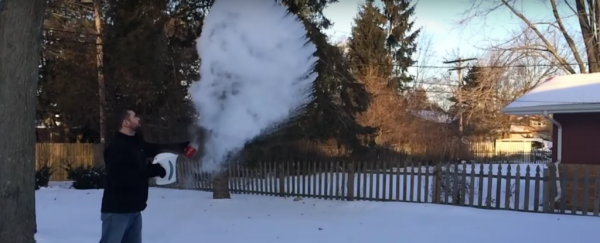Lots of you in the Northern Hemisphere will be in the middle of yet another winter, and some might even be experiencing the sub-zero temperatures to do some cool experiments, such as creating giant frozen marbles for the front yard, snapping soap bubbles, or even tossing boiling water into air to create snow (although that last one requires caution, seriously).
If you remember the dreadfully cold winter of 2013, you might have seen videos like the one we've posted below circulating as 'proof' of the crazy low temperatures. But it turns out this demonstration is actually not that surprising - hot water is in fact known to freeze faster than cold water. There are records of this from as far back as Aristotle's time.
In modern times, this counterintuitive property has been named the Mpemba effect, after a Tanzanian secondary school student who re-discovered this phenomenon back in 1963.
Erasto Mpemba and other kids at his school often made ice cream using the school freezer - they would do this by boiling milk and mixing it with sugar, which then had to be cooled and placed in the freezer. One day, Mpemba rushed the process and stuck the milk in while still hot, and to his surprise, the ice cream formed quicker than for his classmate. Unsurprisingly, none of his teachers believed the 13-year-old.
Mpemba later teamed up with a physics professor who visited his high school, and in 1969 they published a paper, which has since been replicated many times - most often with a similar result. Although if you try this at home and fail, it's probably because the Mpemba effect is not a reliable phenomenon that happens every single time; in fact, there seem to be several factors at play.
So what are they? Well, it's one of those somewhat unsatisfying cases where just because we know something happens, doesn't mean we entirely understand why. But the process of scientific speculation is still interesting, so here are some versions.
The most commonly proposed hypothesis - and one that's probably somewhat responsible for the effect - is that hot water evaporates more quickly, losing mass and therefore needing to lose less heat in order to freeze. However, scientists have also demonstrated the Mpemba effect with closed containers where evaporation doesn't take place.
Another theoretical speculation is that water develops convection currents and temperature gradients as it cools - a rapidly cooling glass of hot water will have greater temperature differences throughout, and lose heat more quickly from the surface, whereas a uniformly cool glass of water has less of a temperature difference, and there's less convection to accelerate the process. But this idea has not been entirely verified either.
Other theories have been put forward, including supercooling, or the effect that dissolved gasses in the water would have on the freezing process. It's likely that several of these actually come into play.
In late 2013, a team of researchers from Singapore proposed in a paper on arXiv.org that the Mpemba paradox stems from the unique properties of chemical bonds in the water. A standard water molecule contains one oxygen atom and two hydrogen atoms joined to it by covalent bonds sharing electron pairs between the atoms.
But when you put several water molecules together, the hydrogen atoms will also form bonds with oxygen atoms in other molecules. These hydrogen bonds are what gives water some of its properties, such as having a relatively high boiling point, and becoming less dense when frozen.
According to the researchers, when water boils, the molecules spread out, lengthening the hydrogen bonds - but because volume is limited, meanwhile the covalent bonds within individual molecules get compressed, storing away energy. If water is frozen at this state, the bonds release energy as an uncoiled spring, cooling down much more quickly than if the covalent bonds were less compressed.
However, even though many headlines heralded this as the definitive explanation for the Mpemba effect, the idea is yet to be published in a peer-reviewed journal. According to the blog of Physics arXiv, the theory is convincing, but lacks predictive power:
"Xi and co need to use their theory to predict a new property of water that conventional thinking about water does not. For example, the shortened covalent bonds might give rise to some measurable property of the water that would not otherwise be present. The discovery and measurement of this property would be the coup de grâce that their theory needs."
As Adam Mann wrote at Wired, this explanation is also not strongly supported in the scientific community. "When we talked to chemist Richard Zare of Stanford University, he was unconvinced of its merits and said he thinks the dominant force at play is evaporation."
Still, it's fun to (carefully) try this at home.
